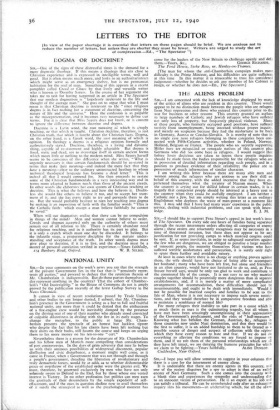LETTERS TO THE EDITOR
[In view of the paper shortage it is essential that letters on these pages should be brief. We are anxious not to reduce the number of letters, but unless they are shorter they must be fewer. Writers are urged to study the art of compression.—Ed., The Spectator "]
DOGMA OR DOCTRINE?
Sm,—One of the signs of these distressful times is the demand for a more dogmatic theology. If this means a theology that sits close to Christian experience and is expressed in intelligible terms, well and good. But it often means much more, and looks to an authoritarianisin which might serve as an emergency shelter, but is no permanent habitation for the soul of man. Something of this appears in a recent pamphlet called Creed or Chaos by that lively and versatile writer who is known as Dorothy Sayers. In the course of her argument she takes me to task for having suggested in an article in The Spectator that our modern dogmatism is " hopelessly irrelevant to the life and thought of the average man." She goes on to argue that what I must mean is that Christian doctrine is irrelevant to life " since religious dogma is in fact nothing but a statement of doctrine, concerning the nature of life and the universe." Here the confusion is as palpable as the misrepresentation, and it becomes very necessary to define c..ur terms. For it is clear that Miss Sayers does not know, or is content to ignore the difference between doctrine and dogma.
Doctrine is a Latin word, the root meaning of which is simply teaching, or that which is taught. Christian doctrine, therefore, is just Christian truth, that which is taught about the Christian facts. Dogma, on the other hand, is a Greek word, the root meaning of which is opinion. In theology a dogma is a religious opinion formally and authoritatively stated. Doctrine, therefore, is a living and dynamic thing, capable of re-statement and highly adaptable But dogma is fixed, static and dead, apt to stereotype itself in certain ancient forms which mean little or nothing to the modern mind. Miss Sayers herself seems to be conscious of this difference when she writes, " What is urgently necessary is that certain fundamentals should be re-stated in terms that make heir meaning—and indeed the mere fact that they have a meaning—clear to the ordinary uninstructed heathen to whom technical theological language has become a dead letter." This is indeed all that I would contend for. She then proceeds to restate some of the Christian fundamentals in a very interesting way and in terms more adapted to human needs than those of the ancient creeds. In other words she elaborates her own system of Christian teaching or doctrine. This is what she believes and how she believes it. Doubt- less she would like others to believe it too, and to accept her state- ment of it, and she has every right to try and persuade them to do so. But she would probably hesitate to turn her teaching into dogma by making it an imposition of faith with the familiar words " This is the Catholic faith: which except a man believe faithfully he cannot be saved."
When will our dogmatists realise that there can be no compulsion in things of the mind? Men and women cannot believe to order. Creeds and dogmas accepted only on the authority of others must remain out of all relation to life There is certainly abundant need for religious teaching, and in it authority has its part to play. But it is only a crutch which must one day be discarded. It belongs to the infantile stage, a preparatory discipline for the mature under- standing and acceptance of the truth. In other words dogma must give place to doctrine, if it is to live, and the doctrine must be a matter of personal conviction verified in experience.—Yours faithfully,


























 Previous page
Previous page